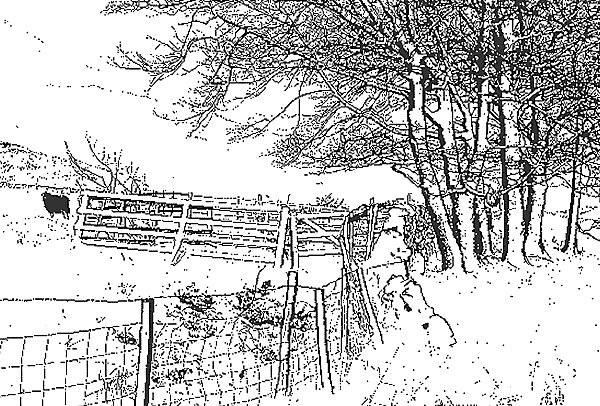RICHARD BAKEWELL - ARTIST/ART HISTORIAN
I have always been interested in landscape ever since I was able to walk to the top of the road my parents lived in, in Blackburn, Lancashire, and climb on to a water tank from where there was a magnificent view over the Ribble Valley and across to the Forest of Bowland.
When I was at school, I made many cycle trips into the Forest of Bowland, and studied biology to gain a greater understanding of the landscape. After moving to Sheffield I felt I wanted to express my feelings about the landscape, and became interested in man`s relationship with the land throughout history: these interests gained me a BA in Fine Art and an MA in Art History.

EXHIBITION: Images of the Peak District in Winter have been made by using Photoshop on an AppleMac computer.
The landscape has been reduced to pixel squares of pure black and white. Landscape nourishes our sense of rootedness with the earth. In our computer-driven world there is less chance of us realising our complete dependence on it. Only at week-ends and holidays can we have some sort of relationship with the landscape, and this is mainly for recreational purposes. Humankind`s mastery of the landscape over the centuries, as can be seen depicted in art, has changed our awareness of what landscape means to us today.
The health of the landscape is maintained by a proper ecological balance between taking from and putting back. In the 21st century, however, this two-way system is complicated by the global market. If market conditions go against an area, economic disaster can result. This has happened in the Peak District, where falling livestock prices, due to lack of demand and over-production, has forced many Derbyshire farmers to diversify into the tourist industry or go out of business.
In the future, computers could be put to good use in aiding the creation of environmentally-friendly `green` technology, or they could be used to push further the devouring consumer society we live in, which bears a new threat to the landscape, and ourselves with it.
My
images of the Peak District look almost desert-like: the changing light
and weather is virtually all there is to see. Is this all that is left
for the future of the landscape?